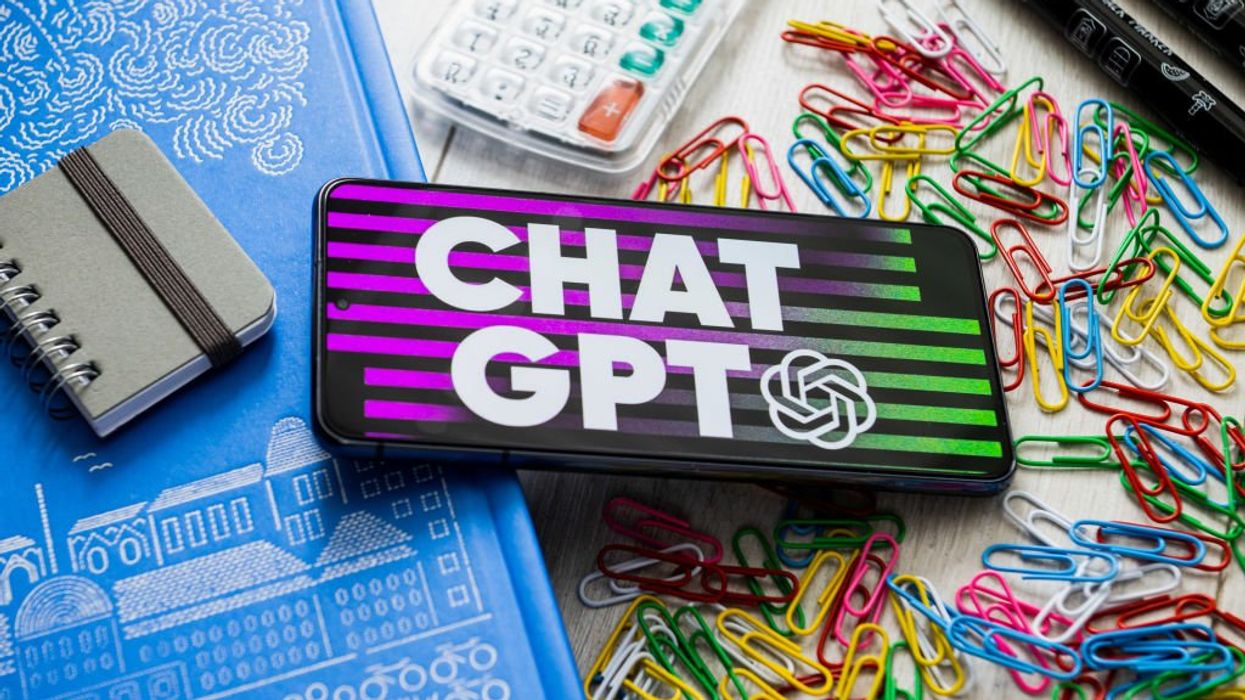
Photo Illustration by Mateusz Slodkowski/SOPA Images/LightRocket via Getty Images

Facing replacement, John Henry, the steel-driving man of American legend, gave his all to drill holes faster than the steam-powered drilling machine poised to replace him. In the case of American school teachers, it would appear some are keen to ride their profession's equivalent of the drilling machine to the finish line.
A new poll commissioned by the nonprofit Walton Family Foundation and conducted by Impact Research recently gauged teachers' level of adoption of the AI chat bot ChatGPT.
Of the 1,002 K-12 teachers surveyed from Feb. 2-7, 51% of respondents said they were using the technology to perform their duties. Impact Research noted that this was especially true of black (69%) and Latino (69%) teachers.
Teachers are not just using the technology to supplement their efforts. In many cases, they're having ChatGPT do much of the heavy-lifting all on its own.
"Three in ten teachers have used it for lesson planning (30%), coming up with creative ideas for classes (30%), and building background knowledge for lessons and classes (27%)," reported Impact Research.
Middle school and high school teachers are more likely to have thrown in the proverbial sledgehammer, with 38% and 35% of those surveyed having used ChatGPT for lesson planning, respectively. The same cadre also uses the technology to brainstorm for ideas (38% and 34%) and "build background knowledge" (31% and 34%), far more than pre-K and elementary-school teachers.
Unsurprisingly, 88% of teachers unburdened of much of their responsibilities reported that ChatGPT has had a positive impact. 76% of teachers noted that the technology will be important to integrate into schooling in the future, and another 77% agreed it would "help them grow as teachers."
Education Week reported in January that some teachers advocating for ChatGPT "say that the tool can save them hours of work, freeing up time for student interactions or their personal life."
Holdouts who find value in the work they've been paid to do claim that deferring to ChatGPT — whose designers have restricted it to a narrow worldview — will strip away some of the creative and rewarding aspects of the job.
"To me, lesson planning is the fun part. I don’t want to hand that over to a chat bot," said Madi Saenz-Payne, an English/language arts teacher in California. "It takes the human side out of it. ... Making so much of [teaching] automated — I feel like you lose some of the joy of it."
It appears Saenz-Payne is in the minority, granted 63% of teachers agreed that "ChatGPT is just another example of why we can't keep doing things the old way for schools in the modern world."
Suresh Prabu, chancellor of India's Rishihood University, and his vice chancellor, Shobhit Mathur, recently discussed in the Economic Times the impact ChatGPT may ultimately have on the teaching profession.
They noted, "AI-based natural language chatbots are much advanced. They will become our very own personalised all-knowing teachers available to us all the time. The chatbot can crunch tremendous amounts of information available to it, draw inferences from them and create persuasive arguments in a personalised manner based on human inputs."
With a personal teacher on hand, flesh-and-bone instructors may have to "reinvent" themselves, possibly into "'meta-teachers' for which they will need to be trained."
According to the two university administrators, teachers may end up having to "teach the purpose of learning, what is worth learning and how to learn."
Stephen Lockyer, a primary school teacher in West London, is amenable to this sort of reinvention, claiming, "Your lesson plans are your recipe — you still need a chef. You still need a teacher to make that recipe come alive.
"If you’ve got a plan that’s bare bones that you can build on and flesh out and make wonderful, then that’ll save so much time," added Lockyer.
It's unclear whether teachers should receive the same pay and benefits for "chef" work.
Keith Kindred, a social studies teacher at South Lyon East High School near Detroit, Michigan, doesn't think teachers need to panic just yet.
Kindred said on Michigan Radio, "ChatGPT and other AI applications can clearly do some pretty amazing things and definitely save time, but what it produces — for students and teachers — is not 'off the shelf' ready. It lacks, not only the human touch, but the depth of understanding and nuance that only human brains can generate."
Were learning to migrate nationwide from brick-and-mortar classrooms to the metaverse, a human touch may not be missed, particularly if new generations never felt it.
Sheila Jagannathan, a manager at the World Bank, suggested in a recent World Economic Forum piece that the "metaverse facilitates an immersive campus life, where learners wearing VR headsets enter the virtual campus or university to learn, explore, and socialize. In this digital space, for example, learners can delve into different learning pods, visit libraries and breakout rooms, meet coaches and counselors, and hang out with peers."
While the teachers' unions may be able to slow the transition to virtual classrooms, teachers' adoption of their potential replacements may expedite the process overall.
"We are only at the very beginning of seeing how this can unlock learning," Romy Drucker, director of the K-12 Education Program at the Walton Family Foundation, told Axios. "What we see in the data is that teachers need better tools and resources to meet this moment, and that's why they're among the earliest adopters of ChatGPT."
Like Blaze News? Bypass the censors, sign up for our newsletters, and get stories like this direct to your inbox. Sign up here!